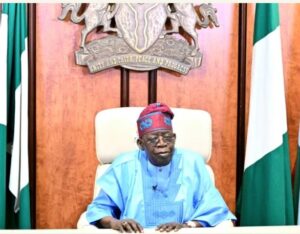Solutions to Nigeria’s Problems for President Tinubu to Revitalize the Economy
Solutions to Nigeria’s Problems for President Tinubu to Revitalize the Economy

President Bola Tinubu
President Bola Tinubu is recognized for his commitment to helping others and his strategic networking over decades, leading to his current position. This preparation and the construction of a nationwide support base have involved significant investment of both time and resources. The “emi lokan” (it’s my turn) slogan reflects his long-term efforts to reach this point, underscoring his dedication.
His aim is to use his presidency to enhance the country’s prosperity, drawing inspiration from past leaders like Awolowo and MKO Abiola, as well as from periods of national growth under leaders such as Olusegun Obasanjo. This reflects his intention to bring about significant improvement, as symbolized by his “renewed hope agenda.”
However, there’s wisdom in evaluating past policies to guide future actions. Current economic symptoms have persisted for too long, and it’s time for a comprehensive review with stakeholders, akin to consulting experts in the medical field. Effective solutions must be sought to guide the nation out of its current difficulties.
Revisiting the policy of floating the naira is essential. Currency devaluation poses risks for import-dependent economies. Historical examples from Russia, Germany, and China show that currency fluctuations can lead to negative outcomes unless carefully managed. Nigeria should aim to lead Africa in currency stability rather than follow risky policies.
If the goal is to prevent currency manipulation, technology and close monitoring can help ensure that foreign exchange is used appropriately. The government must address those engaging in round-tripping and ensure transparency to prevent further naira depreciation.
Regarding subsidy removal, many countries use subsidies in various forms. A more balanced approach could involve leveraging federal tax rates to offset the impacts of subsidy removal on the most vulnerable. Addressing corruption in subsidy allocation is crucial, and mechanisms should be in place to prevent fraudulent claims.
If reversing subsidy removal proves challenging, creating a Subsidy Trust Fund could help fund vital projects such as solar power initiatives, agricultural support, and primary health care. This fund could mitigate the adverse effects of subsidy removal on citizens.
High interest rates and currency devaluation negatively impact domestic businesses, especially when compared to foreign competitors with lower borrowing costs. The Central Bank of Nigeria should reassess these policies to protect local businesses from being outpaced by international competitors.
On national security, especially in farming communities, the government should intensify efforts to ensure the safety of farmers and address the root causes of violence. Expanding state policing and revitalizing farm settlements could significantly improve agricultural productivity and security.
The National Orientation Agency (NOA) should be reformed to enhance public education and patriotism. Economic empowerment is crucial in addressing social issues, and promoting national pride through various media channels can foster positive change.
President Tinubu should also consider a cabinet reshuffle to ensure that only effective individuals are in key positions. Exploring talent from various backgrounds, including opposition, may provide new perspectives and solutions.
In conclusion, President Tinubu should review current policies on interest rates, currency floatation, and subsidy removal. It’s not too late to make necessary adjustments for the benefit of the nation. A focus on practical, citizen-centered policies will be vital for achieving long-term economic success.
TRENDING SONGS
 Ahmad Yerima: Naval Officer to Face No Sanctions After Clash with Wike – Matawalle
Ahmad Yerima: Naval Officer to Face No Sanctions After Clash with Wike – Matawalle
 Trending Video: Muslim Man Joins Wife in Hallelujah Challenge ‘Dress Like Your Miracle’ Night
Trending Video: Muslim Man Joins Wife in Hallelujah Challenge ‘Dress Like Your Miracle’ Night
 Woman Seeks Advice as Late Brother’s Wife Refuses to Mourn Him Following His Death With Alleged Mistress
Woman Seeks Advice as Late Brother’s Wife Refuses to Mourn Him Following His Death With Alleged Mistress
 Nobody Cares About Fine Girls In The UK, I Miss Nigeria — Nigerian Lady Laments
Nobody Cares About Fine Girls In The UK, I Miss Nigeria — Nigerian Lady Laments
 Wedding Called Off: How Lady Cancels Wedding After Finding Out Finance’s Affairs With Her Bestie
Wedding Called Off: How Lady Cancels Wedding After Finding Out Finance’s Affairs With Her Bestie
 Heartbreak in Ikeja: Lady Weeps After Fufu Found in New Phone Package
Heartbreak in Ikeja: Lady Weeps After Fufu Found in New Phone Package
 Twist of Fate: Man Who Questioned Phyna’s ₦1Billion Demand Mourns Brother in Dangote Truck Crash
Twist of Fate: Man Who Questioned Phyna’s ₦1Billion Demand Mourns Brother in Dangote Truck Crash
 Tragedy in Enugu: Dangote Truck Claims Lives of Family of Five
Tragedy in Enugu: Dangote Truck Claims Lives of Family of Five
 Bangkok Crackdown: Nigerian-Thai Couple in Police Net Over Drug Trafficking
Bangkok Crackdown: Nigerian-Thai Couple in Police Net Over Drug Trafficking
 Family Rift: Reno Omokri’s Ex-Wife Says He Deserted Their Special Needs Son
Family Rift: Reno Omokri’s Ex-Wife Says He Deserted Their Special Needs Son
Share this post with your friends on ![]()













